Fauci's NIH Funded Wuhan Military Scientist Who Died Mysteriously After Filing COVID Vaccine Patent
As we move further down the rabbit hole of exactly what in the devil has been going on in China's 'bat labs,' we now turn our attention to one Zhou Yusen - a Chinese military scientist specializing in coronaviruses who collaborated with the Wuhan Institute of Virology's "Bat Woman," Zhengli Shi - with at least one project to geneticially manipulate coronaviruses having been funded by three grants from the National Institutes of Heath (NIH) - home to Dr. Anthony Fauci - via US universities, according to documents obtained by The Weekend Australian's Sharri Markson - who has written an upcoming book, "What really happened in Wuhan." The previously undisclosed NIH funding of a PLA military scientist is separate from millions in grants awarded EcoHealth alliance, which also collaborated with the WIV.
The revelation shows American money was funding risky research on coronaviruses with People’s Liberation Army scientists – including decorated military scientist Zhou Yusen and the Wuhan Institute of Virology’s “Bat Woman”, Shi Zhengli.
Now we learn that Zhou, 54, is dead - three months after filing a patent for a COVID-19 vaccine in Feb. 2020.
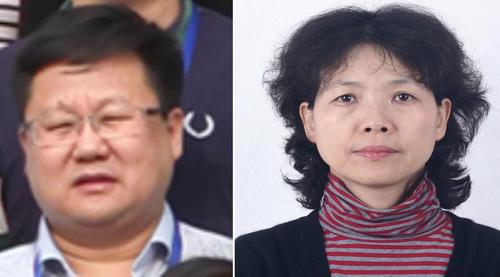
According to the report, Zhou's May 2020 death went largely under the radar, despite the fact that he was an award-winning scientist at the PLA's Laboratory of Infection and Immunity at the Beijing Institute of Microbiology and Epidemiology. "There were no reports paying tribute to his life. His death was only mentioned in passing in a Chinese-media report in July and at the end of a December scientific paper. Both had the word “deceased” in brackets after his name."
And while Zhou's death may have been suspicious (or he may have simply died of COVID), the revelation that the US government was funding his research with the WIV may provide a clue as to why US officials - Dr. Fauci (backed by the 'scientific community' after his lapdog, EcoHealth Alliance's Peter Daszak, penned a 'natural origin or you're a lunatic' letter in the Lancet) - peddled the CCP's 'natural origin' theory, while any suggestion that it could have been created in and/or leaked from the very lab which received NIH dollars was strictly verboten.
Emails released under a Freedom of Information request from Buzzfeed this week showed that, in the early days of the pandemic, Dr Fauci was concerned that US funding had gone towards gain-of-function research in China.
In other emails, scientists wrote to Dr Fauci expressing the preliminary view that the SARS-CoV-2 genome appeared “inconsistent with expectations from evolutionary theory” and that it had some features that “potentially look engineered”. -The Weekend Australian
In short, 'conflict of interest' doesn't even begin to explain what Fauci is now going to have to explain the next time Rand Paul has him in the hot seat.
The revelation shows American money was funding risky research on coronaviruses with People’s Liberation Army scientists – including decorated military scientist Zhou Yusen and the Wuhan Institute of Virology’s “Bat Woman”, Shi Zhengli.
...
National security sources said the ties between Zhou and Dr Shi supported claims by US intelligence that the Wuhan Institute of Virology was engaged in “secret military activity.” -The Australian
How long was China sitting on the genetic sequence for SARS-CoV-2?
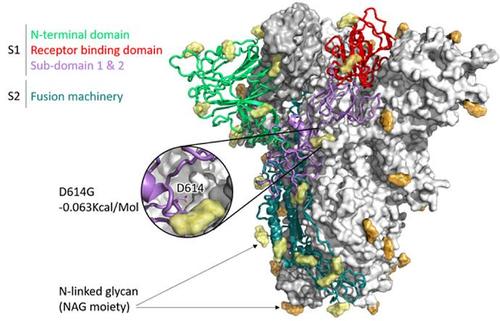
If we're considering the timeline and its implications, Zhou died three months after filing a Feb. 24, 2020 patent application for a COVID-19 vaccine. While this could mean that he was working on a COVID-19 vaccine before the virus became public knowledge in December 2019, keep in mind that Moderna was able to design the sequence for their COVID-19 vaccine just two days after Chinese officials released its genetic sequence on Jan. 11, 2020 - filing for their first related patent in March, two months later.
Also note that Zhou had been working on coronavirus vaccines since at least 2006 in response the original SARS-CoV outbreak - authoring a study which found that "the vaccines containing the (receptor-binding domain) of SARS-CoV S protein may induce sufficient neutralising antibodies and long-term protective immunity against SARS-CoV challenge in the established mouse model."
So, assuming an expert would need approximately two months to go from genomic sequence to patent application, it implies that China withheld the genetic sequence for a month before its Jan. 11 public release. Or, Zhou may have had more of a 'head start' than that.
"This is something we have never seen achieved before, raising the question of whether this work may have started much earlier," said Nikolai Petrovsky from Flinders University.
(And if one wants to explore the implications assuming SARS-CoV-2 was genetically engineered, Karl Denninger has some thoughts below)
And while we may never know the full extent of Zhou's role in all of this, he and 'bat woman' Zhengli were working on a COVID vaccine right before the pandemic.
Per the Weekend Australian:
Right before the pandemic, Zhou and three other scientists from the PLA-run Beijing Institute of Microbiology and Epidemiology – Yuehong Chen, Lei He and Shishui Sun – partnered with two Wuhan Institute of Virology scientists – Dr Shi and Jing Chen – and eight Chinese scientists now based in the US at the University of Minnesota and the Lindsley Kimball Research Institute, New York Blood Centre. Their paper, titled Molecular Mechanism for Antibody-Dependent Enhancement of Coronavirus Entry, was submitted to the Journal of Virology on November 27, 2019, and was published on February 14, 2020.
The research examined MERS and SARS coronaviruses as avenues for antibody-based antiviral drug therapy to treat coronaviruses.
Their paper had some positive results: “Taken together, our results show that RBD-specific neutralising MAbs bind to the same region on coronavirus spikes as viral receptors do, trigger conformational changes of the spikes as viral receptors do, and mediate ADE through the same pathways as viral-receptor-dependent viral entry.”
They found this “novel molecular mechanism for antibody-enhanced viral entry” could “guide future vaccination and antiviral strategies”.
This study was conducted “in vitro”, meaning in a petri dish or test tube, using humanised kidney and lung cells. Their last paragraph indicated the next step in a future paper would be to conduct “in vivo” experiments with humanised mice or primates. A paper published in Nature Reviews Immunology 18 months later, in April this year, would find that “neutralising monoclonal antibodies” could help the treatment of Covid-19.
Meanwhile, Zhou's patent application states: "The invention relates to the field of biomedicine, and relates to a Covid-19 vaccine, preparation methods and applications. The fusion protein provided by the invention can be used to develop the Covid-19 protein vaccine and a drug for preventing or treating the Covid-19."
Yusen Zhou (周育森) (‡)
— 德意志之鹰 (@dezying) June 4, 2021
1. Gain-of-function of viral entry (Shibo Jiang, and Fang Li, search them for more info)
2. Vaccine patent on 2020.02.24 (Wei Chen, Yusen Zhou, Ningyi Jin...)
3. Animal Model (Chuan Qin)
4. The NIH-PLA Network:
left to right = infiltration pathway pic.twitter.com/M5E14ylSM9
What does this all mean now? Karl Denninger has a few thoughts via market-ticker.org, and is notably very suspicious of the patent timing (edited for brevity):
So what do we now know?
- China's military was in fact involved at the Wuhan lab. It was not just a civilian operation. This, by the way, has been repeatedly denied over the last year and change.
- The lab's scientists knew not only the sequencing of the virus but in addition had a patentable way to create an alleged vaccine before the pandemic was public. It takes time to draft patents and figure them out. Quite a lot of time, in fact -- not a couple weeks or months.
- It takes time to prove up patent material, including in the case of a vaccine. To patent something you must be able to demonstrate it; you cannot patent ideas, only embodiments of ideas. In that case you would have to prove immunogenicity which isn't instantaneous; it takes weeks or even months to get through original science on this with animals and then humans, which means the date of knowledge was not February 24th it was months or even further before that.
- That means they were working on this even before that time because to work on a vaccine you have to know you must or would want to work on it in the first place. This in turn means they knew damn well there was a virulent virus in the wild prior to that date, or they released it or intended to release it into the wild on purpose. Nobody comes up with a vaccine for a virus you intend to and have confined entirely within a laboratory in animal or cell culture testing; that's worthless. Without an isolate to create a vaccine for and a virus outside of a lab environment where vaccination becomes a "thing" that might be required and thus have value why would you do the work to create one?
What's the timeline on all this? Many, many months or even a couple of years.
That means either the virus was "out" for many months to a couple of years before February of 2020 (not a month or two) or the Chinese intended to release it in the fall of 2019. In either case the evidence is now overwhelming that this was not a virus that "magically appeared" one fine day in late December having come naturally from bats and perhaps pangolins. That is not just improbable anymore -- it is now, on the manifest weight of the evidence, impossible.
...
Next up is exactly what sort of vaccine patent we're talking about here?
Specifically how is it that the "stiffened" areas in the viral vector and mRNA shots we're using in the US came to be known and proved up? How did Moderna and Pfizer know they needed to do that? That sort of study takes months if not years too, not days or weeks, to both come up with it and then prove it actually works as expected.
Remember that Covid-19 has a rather-unique site on the spike called the "furin-cleavage" area which it uses to "fold" and get into the cell; the S1 unit attaches, the cleavage area "folds" and then the second part penetrates the cell wall like a spear. SARS and MERS both lack this structure so there was no "prior art" to use and in the first couple of months the characterizing of all of this was pretty darn new.
Yet the "official story" is that these folks had a proposed candidate configuration, including the replacement of encodings to "stiffen" that area within days of the publication of the viral RNA sequence for Covid-19.
Is the completed work in that area what the Chinese "gave" us complete with that part of the work already done? That would explain how it happened that quickly, wouldn't it? I'd sure like to understand how someone -- anyone -- does that sort of work complete with the lab verification in cell cultures and animals, reachig those conclusions in days.
What are the connections there? I'd like a full explanation of that please.



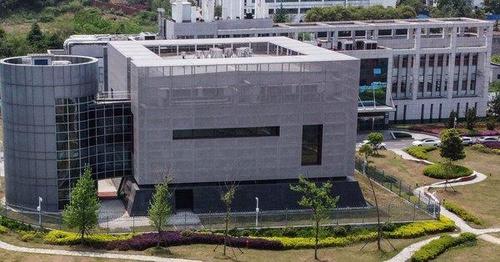
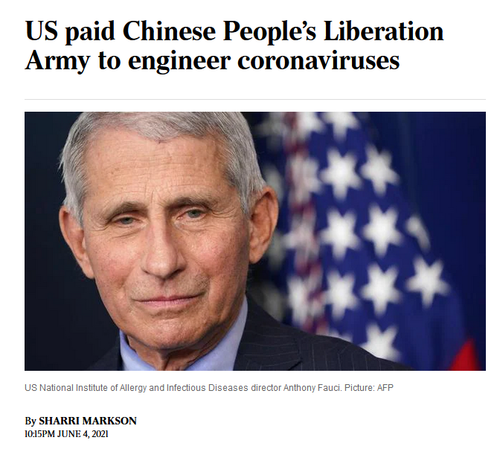
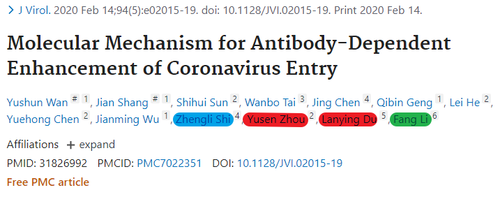
No comments:
Post a Comment